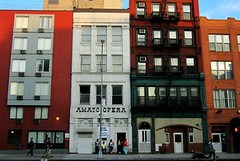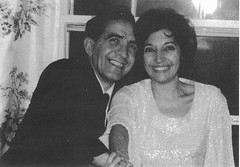Anthony Amato, who founded the Amato Opera and trained generations of opera singers at his small theater on the Bowery, died yesterday morning on City Island. He was 91.
Rochelle Mancini, a former singer at the Amato Opera who helped Mr. Amato write his recently published memoir, said the cause was cancer.
From its founding in 1948, the Amato Opera served as a training grounds for young singers with grand ambitions. Mr. Amato was said to have a keen eye for talent, and the likes of Neil Shicoff, Mignon Dunn and George Shirley performed there before going on to play famous venues like the Metropolitan Opera and City Opera.
After stints in theaters around the city, the opera opened on the Bowery at East Second Street in 1964; a location that harkened back to the thoroughfare’s history as a poor man’s Broadway. Less than 10 years after its opening it would share the block with C.B.G.B.; a vivid example of the eclectic arts scene in the neighborhood.
The opera was a true mom-and-pop operation. Mr. Amato and Ms. Bell would sweep the sidewalks, sell tickets, and sow the costumes. At times Ms. Bell would leave the ticket booth and immediately go on to the small stage to sing a lead role.
Mr. Amato, meanwhile, managed the extraordinary amount of people involved in his productions. The 107-seat theater would present six operas a year at the minimum, with 12 performances each. Ms. Mancini said it was typical to have at least six completely different casts for each opera. Mr. Amato’s labor of love was hailed for its resiliency and accessibility. Novice singers could make it on stage and opera lovers without fat wallets could get front-row seats.
Of course, the opera had its fair share of charming mishaps. In Mr. Amato’s memoir, “The Smallest Grand Opera in the World,” he recalls that during the Act II finale of a performance of “The Marriage of Figaro,” the opera’s six-foot, eight-inch bass-baritone managed to dislocate his shoulder while dramatically tossing a stack of papers into the air. Mr. Amato, a five-foot, three-inch tenor, took over the lead role only to have the original Figaro return to the stage in the final act with his arm in a sling. In a separate production of “Madama Butterfly,” an elderly woman wandered onto the stage before a pair of geishas could escort her to the restroom at the rear of the theater.
Ms. Bell died in 2000, and Mr. Amato carried on with the opera. In 2009 he directed one last performance of “The Marriage of Figaro” and closed the opera house, citing the extraordinary workload, as well as a lack of suitable successors.
In his final years. Mr. Amato devoted his energies to his memoir, as well as his program at the Manhattan School of Music, which trains young singers and performs abridged operas for students.
Last month, as The Local reported, he was too ill to appear at a scheduled reading of the memoir, and Ms. Mancini read passages to a gathering of about approximately 100 spectators, including his students and former singers and stagehands.
“Had circumstances permitted, I’m sure he would have kept the opera going another 50 years,” Ms. Mancini said today.
Information regarding the wake and funeral mass for Mr. Amato can be found here.
Related: Slideshow: Inside the Amato Opera Building, Still on the Market






